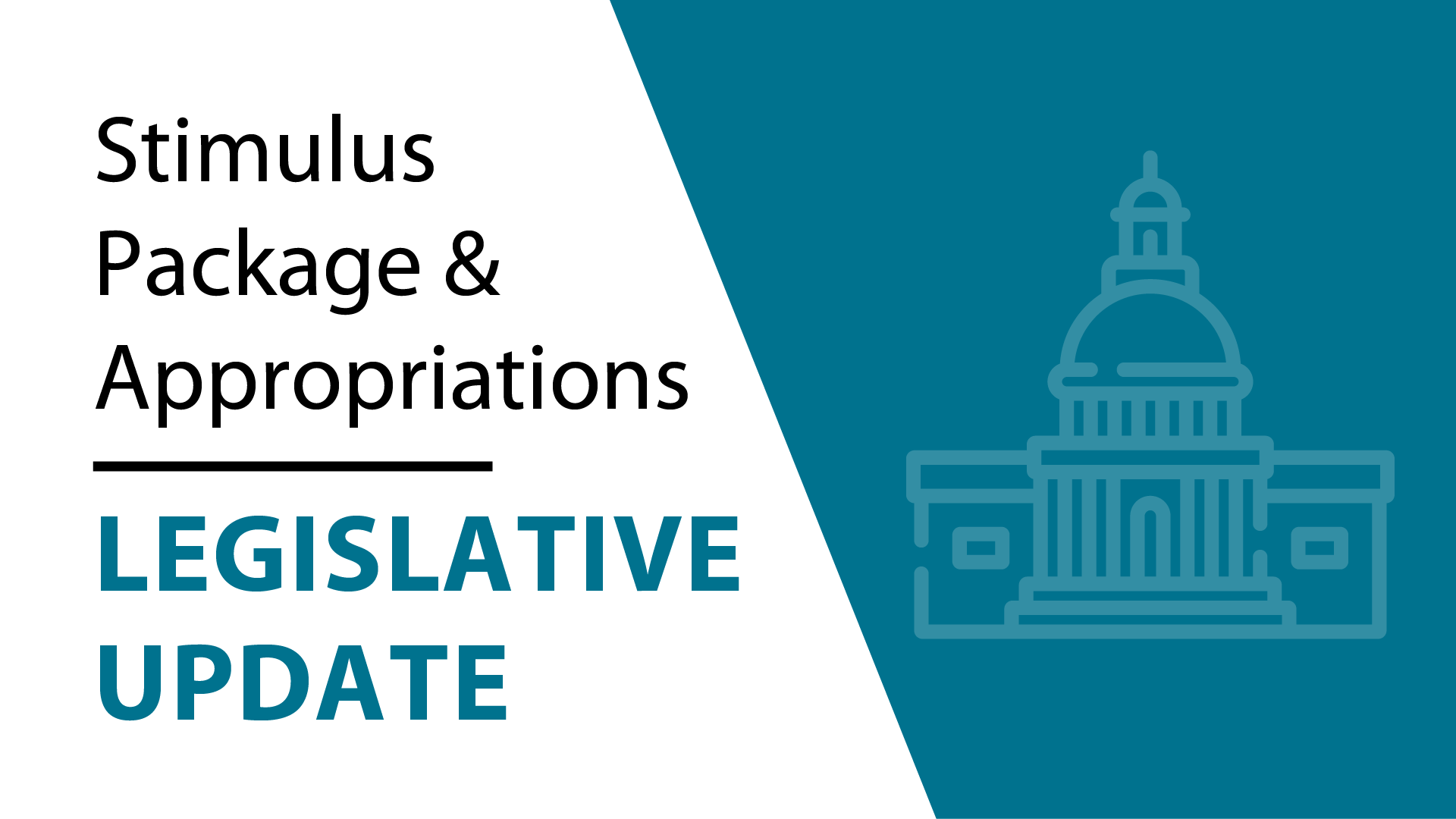This website uses cookies so that we can provide you with the best user experience possible. Cookie information is stored in your browser and performs functions such as recognising you when you return to our website and helping our team to understand which sections of the website you find most interesting and useful.
News
Legislative Update: Stimulus Package & Appropriations
Coronavirus Stimulus Package
On July 28, Senate Republicans introduced their $1 trillion Phase 4 coronavirus stimulus package entitled “The Health, Economic Assistance, Liability Protection and Schools (HEALS) Act.” The package is a series of bills aimed at starting negotiations with House Democrats that have already passed the $3 trillion Health and Economic Recovery Omnibus Emergency Solutions Act (HEROES Act, H.R. 6800).
The HEALS Act has the backing of Senate Majority Leader Mitch McConnell (R-KY) and the White House, but not the entire Republican conference. Negotiations are off to a rocky start as both sides remain far apart as the eviction moratorium and extended unemployment insurance (UI) benefits have lapsed. While the two bills contain several proposals that are likely to not make it in the final package, but there are also several “must-have” proposals that need to resolved including the extension of UI benefits, funding for cities and states, liability protections for businesses, and schools, and funding related to schools.
The most contentious sticking point so far has been unemployment benefits. Democrats have remained steadfast that the next bill includes the $600/week unemployment insurance through Jan. 2021 to keep the unemployed afloat and keep money being spent in the economy. Republicans are concerned that the extra $600/week benefit provides many workers with higher incomes than when they were working, so there is not incentive for them to return to work. The HEALS Act proposes a supplemental $200/week unemployment benefit through Sept. 30 and requires that states pay 70 percent of lost wages to unemployed persons from Oct.1 through the end of 2020.
The Republican HEALS Act provides additional assistance for businesses including:
Small Business Assistance
- Provides $190 billion ($90 billion in new funds and $100 billion from unused funds) for an additional disbursement from the Paycheck Protection Program (PPP) for businesses under 300 workers with at least 50 percent lost revenue.
- Expands what borrowers can spend PPP loans on to include certain operations costs; property damage costs from 2020 public demonstrations that insurance does not cover; payments to suppliers for goods already under contract that the business needs; and costs for complying with COVID-19 health guidelines such as buying personal protective equipment (PPE).
- Provides $100 billion for recovery sector loans through the Small Business Administration’s (SBA) 7(a) loan program. Recovery Sector Businesses can receive two times their annual revenue, with a limit of $10 million. The loan has a 1 percent interest rate and a 20-year maturity, and borrowers can defer payments for up to two years.
- Provides $10 billion for an equity investment facility through the SBA’s Small Business Investment Company program.
- Allow eligible businesses in bankruptcy proceedings, with court approval, to access PPP loans.
Tax Provisions
- Increase the Work Opportunity Tax Credit (WOTC) for employers from $2,400 to $5,000 per newly hired employee and allow the tax credit to apply to hiring employees who were affected by COVID-19.
- Expand the Employee Retention Tax Credit (ERTC) from the CARES Act from 50 percent of up to $10,000 wages per year to 65 percent of up to $10,000 in qualified wages per quarter (with a $30,000 annual cap) for companies with at least a 25 percent decline in revenue.
- Provide a refundable payroll tax credit equal to 50 percent of an employer’s qualified employee protection/workplace reconfiguration/workplace technology expenses, with the credit capped based on the number of employees.
- Increase the business meal deduction from 50 percent to 100 percent.
Liability protections
- Provide a five-year safe harbor from lawsuits to businesses, schools, non-profits, and frontline health care workers that follow public-health guidelines.
- Establish liability only for instances of intentional misconduct or proven gross negligence.
Appropriations
The House of Representatives has passed 10 of 12 appropriations bills for FY2020–the Defense bill, Commerce-Justice-Science (H.R. 7667) Energy-Water (H.R. 7613), Financial Services (H.R. 7668), Labor-HHS-Education (H.R. 7614) and Transportation-HUD (H.R. 7616) bills. The bills passed mostly on party lines in two separate packages of a four-bill minibus (H.R. 7613) and a six-bill minibus (H.R. 7617). To read more about what was included in these bills, you can review our previous legislative updates here and here.
The only two spending bills not included were the Legislative Branch and the Homeland Security Appropriations amid disputes about spending levels and policy. The next step would be negotiating the differences between the House and Senate versions, but the Senate has yet to introduce their bills making it more likely that a continuing resolution will need to be passed to keep the government funded past Oct. 1.
As previously reported, these bills contain several provisions of interest, including the Energy and Water Development spending bill, which funds improvements for the nation’s water infrastructure under the U.S. Army Corps of Engineers and Department of the Interior programs. The FY21 spending bill invests $49.6 billion in Energy and Water Development programs, an increase of $1.26 billion, or 3 percent, above the fiscal year 2020 enacted level. The bill provides an additional $43.5 billion in emergency spending to build and repair water infrastructure projects and modernize energy infrastructure. The appropriations committee reports include committee language regarding plastics waste and recycling.


